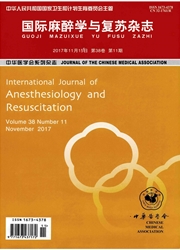

 中文摘要:
中文摘要:
背景非去极化肌肉松驰药(nondepolarizingmusclerelaxations,NDMRs)在临床麻醉及重症监护应用广泛,其作用靶点位于神经肌肉接头(neuromuscularjunctions,NMJs)突触后膜的肌肉型乙酰胆碱受体(muscle-nicotinicacetylcholinereceptor,m-nAChR),多种因素可影响其临床药效。目的阐述影响NDMRs效能的有关m-nAChR改变的因素,为临床麻醉用药提供参考。内容乙酰胆碱受体质和量的改变,包括受体的数量、分布密度、脱敏、磷酸化、构象和亲和力、离子通道阻滞的改变以及脂质和ATP对受体的影响等,都将影响NDMRs效能。趋向希望为探讨NDMRs效能变化的机制提供思路。
 英文摘要:
英文摘要:
Background The non-depolarizing muscular relaxants (NDMRs) are used widely in genegral anesthesia and intensive care. The muscle4ype nicotinic acetylcholine receptor (m-nAChR) site on the postsynaptic membrane of neuromuscular junctions (NMJs) is the target location of the NDMRs. Many factors can affect the potency of NDMRs. Objective This review is to investigate the factors of changing of the m-nAchRs which can affect the potency of NDMRs and provide reference to clinical anesthetic medication. Content All the changes of the quality and quantity of m-nAchR, including the quantity, density, desensitization, phosphorylation, conformation and affinity of the m-nAcbR as well as the state of opening or closing about the ion channels the effect of cholesterin,adenosine triphosphate (ATP) and so on, will affect the potency of NDMRs. Trend To provide some opinions to investigate the mechanisms of affectin the ootencv of NDMRs.
 同期刊论文项目
同期刊论文项目
 同项目期刊论文
同项目期刊论文
 期刊信息
期刊信息
